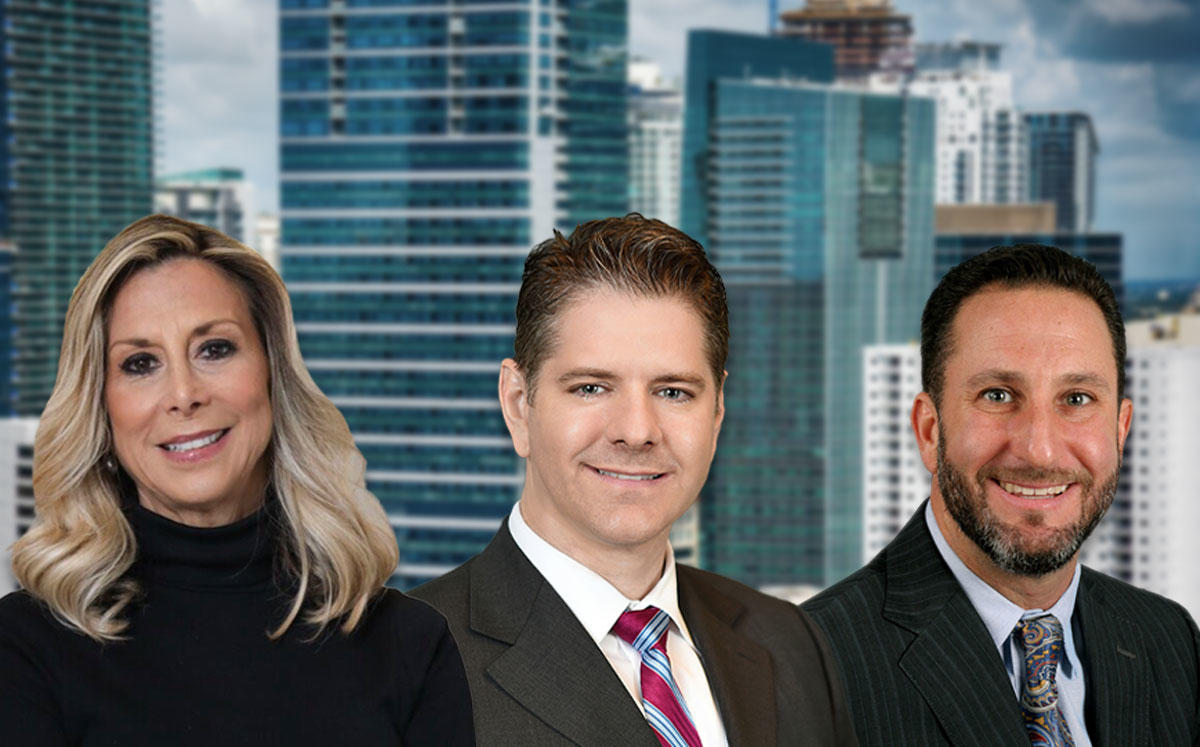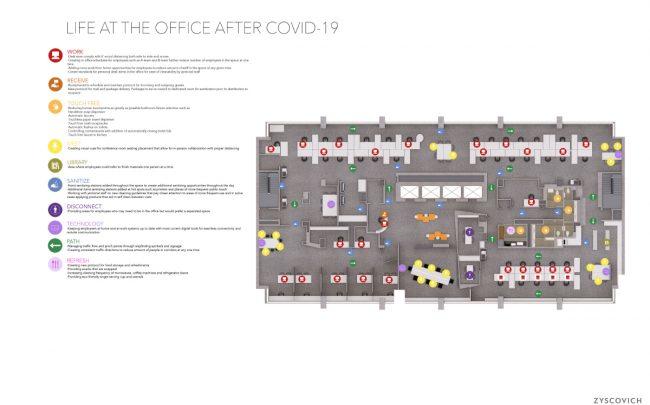At Zyscovich Architects’ headquarters in downtown Miami, returning to work will be a little different.
Guided by arrows, employees and guests will enter the office one way, and exit another. Packages will be rerouted to a room on a separate floor to be unpacked and disinfected. And workers will be encouraged to eat their lunches at their desks.
Like going to a restaurant or entering a residential building, going to work after two months of sheltering in place will include new health and safety guidelines. Employees will have to enter wearing masks, and forget about working out at the building’s gym, or hanging out in the conference center.
In South Florida, companies are slowly beginning their return to the office building. Unlike going to a store or a restaurant, where you may spend an hour or two, going to the office for the full day may cause more anxiety for employers and their employees.
Zyscovich, though considered an essential business, has had most of its employees working from home during the coronavirus pandemic, said Anabella Smith, partner and director of interior design. The architecture and design firm has been preparing for weeks to bring people back to the office, remodeling the restrooms and kitchen, marking where people can be seated in conference rooms and in the workspace, and making sure there are hand sanitizer stations near restrooms and elevators.
“We want them to come back to work feeling safe,” Smith said.
The company, led by Bernard Zyscovich, is getting calls from clients asking about redesigning their spaces and projects for a post-coronavirus world. Yet, Smith said that some developers are “very positive this is temporary, and we have to keep living our lives.”
Publicly, most developers are still moving forward with plans to build new office projects in South Florida. But brokers and lawyers agree that there will be opportunities for tenants to negotiate new lease terms, and for buyers to pick up distressed properties.
For now, office workers throughout South Florida will be required to wear masks upon entering buildings. Deliveries will be handled differently, with some buildings requiring employees to meet their deliveries in lobbies or at the entrances to properties.
Cervera Real Estate is back at work as of Wednesday, with the exception of one office housed inside a Coconut Grove hotel, according to a spokesperson. The brokerage’s new office policy requires masks at all times, six feet of social distancing, and provides hand sanitizer at all entrances. Cervera is also capping the number of sales associates and customers that can be inside its offices or sales centers at any given time.
Though tenants are starting to trickle back into some buildings, there’s still “a lot of concern, obviously, about going back to an office at this point,” said Scott Goldstein, executive managing director at Colliers International South Florida, who focuses on tenant representation. The office is where most workers spent the majority of their wakeful time prior to coronavirus, he said.
“There’s still a real fear, so employers are giving the opportunity for their employees to work from home … until the end of the year in some cases,” Goldstein said. Companies are creating shift schedules and modified in-office working hours, providing personal protective equipment and spacing out desks. Gone are the days of unassigned workspaces. Twitter’s announcement that it will allow some employees to work from home forever sparked intense debate about the future of the office market, he said.
Buildings are also keeping their amenities areas closed, such as gyms and shared conference centers, which have been increasingly prevalent for the last five years. Some will have temperature checks upon entering buildings.
Goldstein believes that the impact to the office market will affect tenants and landlords in the short term, until a vaccine exists.
“There’s a lot of talk about how many people are going to be working virtually,” he said. “I’ve been working virtually for two months now, and I’m frothing at the mouth to go back to the office.”
Coronavirus is forcing office users and providers to address the impact that another pandemic can have, so that the market is better prepared for the next one, Goldstein added. Property owners have been installing touchless technology in their buildings and improving disinfecting and cleaning protocols.
Colliers is offering a service in which someone shoots video of a tenant’s space, and then creates customized recommendations within 48 hours on how the space can be safer and cleaner, which some clients have started using.
Landlords and tenants will have to take precautions to avoid any liability moving forward, said Louis Archambault, a partner with Saul Ewing Arnstein & Lehr. He advises his clients to follow state and local guidelines, in addition to those put out by the Centers for Disease Control and Prevention.
“The virus is potentially weaponized in individuals coming into your property. What did those individuals do to protect themselves? Did they wear masks?” Archambault said. “We all have to be mindful of what we’re doing to protect each other.”

